formerly eScholarship Editions


|
|
|
|
Your search for
'Medicine' in subject
found 76 book(s). | Modify Search | Displaying 1 - 20 of 76 book(s) | |
| 1. | 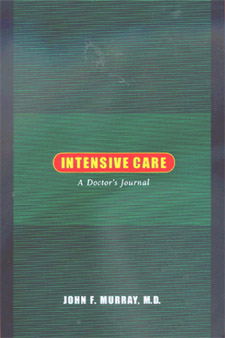 | Title: Intensive care: a doctor's journal Author: Murray, John F. (John Frederic) 1927- Published: University of California Press, 2000 Subjects: Medicine | Aging Publisher's Description: Intensive Care is an affecting view from the trenches, a seasoned doctor's minute-by-minute and day-by-day account of life in the Intensive Care Unit (ICU) of a major inner-city hospital, San Francisco General. John F. Murray, for many years Chief of the Pulmonary and Critical Care Division of the hospital and a Professor at the University of California, San Francisco, takes readers on his daily ward rounds, introducing them to the desperately ill patients he treats as well as to the young physicians and medical students who accompany him. Writing with compassion and knowledge accumulated over a long career, Murray presents the true stories of patients who show up with myriad disorders: asthma, cardiac failure, gastrointestinal diseases, complications due to AIDS, the effects of drug and alcohol abuse, emphysema. Readers will come away from this book with a comprehensive understanding of what an ICU is, what it does, who gets admitted, and how doctors and nurses make decisions concerning life-threatening medical problems. Intensive care for critically ill patients is a new but well-established and growing branch of medicine. Estimates suggest that 15 to 20 percent of all hospitalized patients in the United States are treated in an intensive or coronary care unit during each hospital stay, so there is a real possibility that the reader will either be admitted to an ICU himself or herself or knows someone who will be. Murray not only offers a real-time account of the diagnosis, treatment, and progress of his patients over the course of one month but also conveys a wealth of information about various diseases and medical procedures in succinct and easy-to-understand terms. In addition, he elaborates on ethical dilemmas that he confronts on an almost daily basis: the extent of patient autonomy, the denial of ICU care, the withdrawal of life support, and physician-assisted suicide. Murray concludes that ICUs are doing their job, but they could be even better, cheaper, and--most important--more humane. His chronicle brings substance to a world known to most of us only through the fiction of television. [brief] Similar Items |
| 2. | 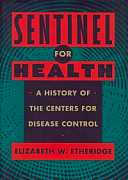 | Title: Sentinel for health: a history of the Centers for Disease Control Author: Etheridge, Elizabeth W Published: University of California Press, 1992 Subjects: History | Medicine Publisher's Description: In the only history of its kind, Etheridge traces the development of the Centers for Disease Control from its inception as a malaria control unit during World War II through the mid-1980s . The eradication of smallpox, the struggle to identify an effective polio vaccine, the unraveling of the secrets of Legionnaires' disease, and the shock over the identification of the HIV virus are all chronicled here. Drawing on hundreds of interviews and source documents, Etheridge vividly recreates the vital decision-making incidents that shaped both the growth of this institution as well as the state of public health in this country for the last five decades.We follow the development of the institution as it was transformed by the will and the imagination of remarkable individuals such as Dr. Joseph Mountin, one of the first heads of the CDC. Often characterized as abrasive and impatient, Mountin pushed the CDC to become a vital player in eradicating the threat of communicable disease in the United States. Others such as Dr. Andrew Langmuir brought the expertise necessary to establish epidemiology as one of the primary functions of the CDC.Created to serve the states and to answer any call for help whether routine or extraordinary, the CDC is now widely recognized as one of the world's premier public health institutions. [brief] Similar Items |
| 3. | 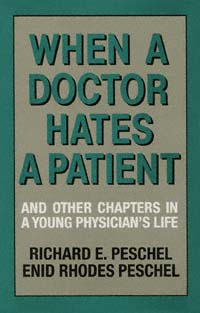 | Title: When a doctor hates a patient, and other chapters in a young physician's life Author: Peschel, Richard E Published: University of California Press, 1988 Subjects: Medicine | Science Similar Items |
| 4. | 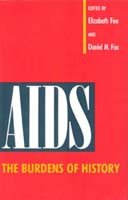 | Title: AIDS: the burdens of history Author: Fee, Elizabeth Published: University of California Press, 1988 Subjects: Medicine | Science Publisher's Description: The AIDS epidemic has posed more urgent historical questions than any other disease of modern times. How have societies responded to epidemics in the past? Why did the disease emerge when and where it did? How has it spread among members of particular groups? And how will the past affect the future - in particular, what does the history of medical science and public health tell us about our ability to control the epidemic and eventually to cure the disease?Historical methods of inquiry change, and people who use these methods often disagree on theory and practice. Indeed, the contributors to this volume hold a variety of opinions on controversial historiographic issues. But they share three important principles: cautious adherence to the "social constructionist" view of past and present; profound skepticism about historicism's idea of progress; and wariness about "presentism," the distortion of the past by seeing it only from the point of view of the present.Each of the twelve essays addresses an aspect of the burdens of history during the AIDS epidemic. By "burdens" is meant the inescapable significance of events in the past for the present. All of these events are related in some way to the current epidemic and can help clarify the complex social and cultural responses to the crisis of AIDS.This collection illuminates present concerns directly and forcefully without sacrificing attention to historical detail and to the differences between past and present situations. It reminds us that many of the issues now being debated - quarantine, exclusion, public needs and private rights - have their parallels in the past. This will be an important book for social historians and general readers as well as for historians of medicine. [brief] Similar Items |
| 5. |  | Title: Beriberi, white rice, and vitamin B: a disease, a cause, and a cure Author: Carpenter, Kenneth J. (Kenneth John) 1923- Published: University of California Press, 2000 Subjects: Science | Medicine Publisher's Description: In this comprehensive account of the history and treatment of beriberi, Kenneth Carpenter traces the decades of medical and chemical research that solved the puzzle posed by this mysterious disease. Caused by the lack of a minute quantity of the chemical thiamin, or vitamin B1 in the diet, beriberi is characterized by weakness and loss of feeling in the feet and legs, then swelling from fluid retention, and finally heart failure. Western doctors working in Asia after 1870 saw it as the major disease in native armed forces and prisons. It was at first attributed to miasms (poisonous vapors from damp soil) or to bacterial infections. In Java, chickens fed by chance on white rice lost the use of their legs. On brown rice, where the grain still contained its bran and germ, they remained healthy. Studies in Javanese prisons then showed beriberi also occurring where white (rather than brown) rice was the staple food. Birds were used to assay the potency of fractions extracted from rice bran and, after 20 years, highly active crystals were obtained. In another 10 years their structure was determined and "thiamin" was synthesized. Beriberi is a story of contested knowledge and erratic scientific pathways. It offers a fascinating chronicle of the development of scientific thought, a history that encompasses public health, science, diet, trade, expanding empires, war, and technology. [brief] Similar Items |
| 6. | 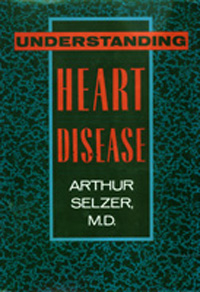 | Title: Understanding heart disease Author: Selzer, Arthur Published: University of California Press, 1992 Subjects: Medicine | Science Publisher's Description: Diseases of the heart are the leading cause of death in the Western world. Health professionals and the general public alike eagerly watch advances in the prevention, diagnosis, and treatment of heart disease. Yet the more spectacular aspects of medical progress in the field are often reported prematurely and their potential benefits exaggerated.Written in clear, accessible language, this book presents an authoritative and balanced picture of how heart diseases are recognized and managed. From his many years of experience, Dr. Selzer believes a well-informed patient can cooperate more successfully with a physician, and his book includes information vital to anyone confronting heart problems and cardiac emergencies. [brief] Similar Items |
| 7. | 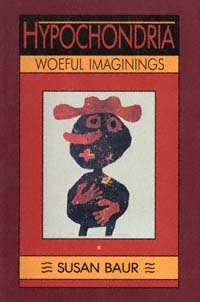 | Title: Hypochondria: woeful imaginatings Author: Baur, Susan Published: University of California Press, 1989 Subjects: Medicine | Science Publisher's Description: Writing with grace, humor, and an expert's eye for revealing detail, Susan Baur illuminates the processes by which hypochondriacs come to adopt and maintain illness as a way of life. Similar Items |
| 8. | 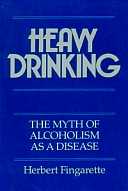 | Title: Heavy drinking: the myth of alcoholism as a disease Author: Fingarette, Herbert Published: University of California Press, 1988 Subjects: Science | Medicine Publisher's Description: Heavy Drinking informs the general public for the first time how recent research has discredited almost every widely held belief about alcoholism, including the very concept of alcoholism as a single disease with a unique cause. Herbert Fingarette presents constructive approaches to heavy drinking, . . . [more] Similar Items |
| 9. | 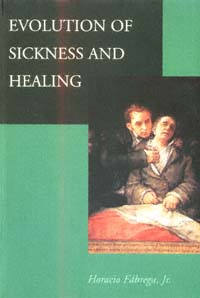 | Title: Evolution of sickness and healing Author: Fabrega, Horacio Published: University of California Press, 1997 Subjects: Medicine | Medical Anthropology Publisher's Description: Evolution of Sickness and Healing is a theoretical work on the grand scale, an original synthesis of many disciplines in social studies of medicine. Looking at human sickness and healing through the lens of evolutionary theory, Horacio Fàbrega, Jr. presents not only the vulnerability to disease and injury but also the need to show and communicate sickness and to seek and provide healing as innate biological traits grounded in evolution. This linking of sickness and healing, as inseparable facets of a unique human adaptation developed during the evolution of the hominid line, offers a new vantage point from which to examine the institution of medicine.To show how this complex, integrated adaptation for sickness and healing lies at the root of medicine, and how it is expressed culturally in relation to the changing historical contingencies of human societies, Fàbrega traces the characteristics of sickness and healing through the early and later stages of social evolution. Besides offering a new conceptual structure and a methodology for analyzing medicine in evolutionary terms, he shows the relevance of this approach and its implications for the social sciences and for medical policy. Health scientists and medical practitioners, along with medical historians, economists, anthropologists, and sociologists, now have the opportunity to consider every essential aspect of medicine within an integrated framework. [brief] Similar Items |
| 10. | 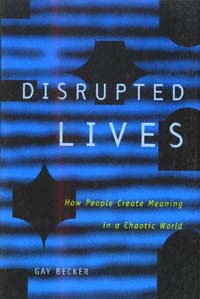 | Title: Disrupted lives: how people create meaning in a chaotic world Author: Becker, Gaylene Published: University of California Press, 1998 Subjects: Anthropology | Medicine | Sociology Publisher's Description: Our lives are full of disruptions, from the minor - a flat tire, an unexpected phone call - to the fateful - a diagnosis of infertility, an illness, the death of a loved one. In the first book to examine disruption in American life from a cultural rather than a psychological perspective, Gay Becker follows hundreds of people to find out what they do after something unexpected occurs. Starting with bodily distress, she shows how individuals recount experiences of disruption metaphorically, drawing on important cultural themes to help them reestablish order and continuity in their lives. Through vivid and poignant stories of people from different walks of life who experience different types of disruptions, Becker examines how people rework their ideas about themselves and their worlds, from the meaning of disruption to the meaning of life itself.Becker maintains that to understand disruption, we must also understand cultural definitions of normalcy. She questions what is normal for a family, for health, for womanhood and manhood, and for growing older. In the United States, where life is expected to be orderly and predictable, disruptions are particularly unsettling, she contends. And, while continuity in life is an illusion, it is an effective one because it organizes people's plans and expectations.Becker's phenomenological approach yields a rich, compelling, and entirely original narrative. Disrupted Lives acknowledges the central place of discontinuity in our existence at the same time as it breaks new ground in understanding the cultural dynamics that underpin life in the United States. FROM THE BOOK :"The doctor was blunt. He does not mince words. He did a [semen] analysis and he came back and said, 'This is devastatingly poor.' I didn't expect to hear that. It had never occurred to me. It was such a shock to my sense of self and to all these preconceptions of my manliness and virility and all of that. That was a very, very devastating moment and I was dumbfounded. . . . In that moment it totally changed the way that I thought of myself." [brief] Similar Items |
| 11. | 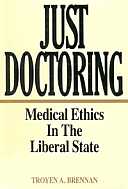 | Title: Just doctoring: medical ethics in the liberal state Author: Brennan, Troyen A Published: University of California Press, 1991 Subjects: Philosophy | Ethics | Medicine Publisher's Description: Just Doctoring draws the doctor-patient relationship out of the consulting room and into the middle of the legal and political arenas where it more and more frequently appears. Traditionally, medical ethics has focused on the isolated relationship of physician to patient in a setting that has left the physician virtually untouched by market constraints or government regulation. Arguing that changes in health care institutions and legal attention to patient rights have made conventional approaches obsolete, Troyen Brennan points the way to a new, more aware and engaged medical ethics.The medical profession is no longer isolated, even theoretically, from the liberal, market-dominated state. Old ideas of physician beneficence and altruism must make way for a justice-based medical ethics, assuming a relationship between equals more compatible with liberal political philosophy. Brennan offers clinical examples of many of today's most challenging medical problems - from informed consent to care rationing and the repercussions of the HIV epidemic - and gives his recommendation for a new ethical perspective. This lively and controversial plea for a rethinking of medical ethics goes right to the heart of medical care at the end of the twentieth century. [brief] Similar Items |
| 12. | 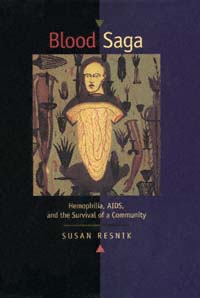 | Title: Blood saga: hemophilia, AIDS, and the survival of a community Author: Resnik, Susan 1940- Published: University of California Press, 1999 Subjects: Science | Sociology | Medicine | Anthropology Publisher's Description: For thousands of years boys known as "bleeders" faced an early, painful death from hemophilia. Dubbed "the Royal Disease" because of its identification with Queen Victoria, the world's most renowned carrier, hemophilia is a genetic disease whose sufferers had little recourse until the mid-twentieth century. In the first book to chronicle the emergence and transformation of the hemophilia community, Susan Resnik sets her story within our national political landscape - where the disease is also a social, psychological, and economic experience. Blood Saga includes many players and domains: men with hemophilia and their families, medical personnel, science researchers, and the author herself, who was Director of Education of the National Hemophilia Foundation in the early 1980s. At that time the "miracle treatment" of freeze-dried pooled plasma blood products enabled men with hemophilia to lead full, normal lives. Then the AIDS virus infiltrated the treatment system and over fifty percent of the hemophilia community became HIV-positive. But rather than collapsing, this community refocused its priorities, extended its reach, and helped shape blood safety policies to prevent further tragedy.The hemophilia community includes people from every socioeconomic and ethnic group, and Resnik's narrative and use of oral histories never lose touch with those affected by the disease. Her extensive informant interviewing allows much of this social history to be told by participants on all levels: parents, wives, nurses, doctors, government agency directors, health care providers, and many others.Gene insertion therapy now holds the promise of a cure for hemophilia in the near future. Scientific breakthroughs inevitably become intertwined with the industry and academic medical centers that govern the national health care system. And in that system, says Resnik, costs and safety are sometimes contending issues. She makes clear that the lessons learned in Blood Saga apply to all of us. [brief] Similar Items |
| 13. | 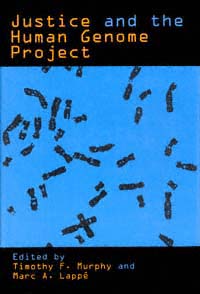 | Title: Justice and the human genome project Author: Murphy, Timothy F 1955- Published: University of California Press, 1994 Subjects: Philosophy | Ethics | Biology | Medicine Publisher's Description: The Human Genome Project is an expensive, ambitious, and controversial attempt to locate and map every one of the approximately 100,000 genes in the human body. If it works, and we are able, for instance, to identify markers for genetic diseases long before they develop, who will have the right to obtain such information? What will be the consequences for health care, health insurance, employability, and research priorities? And, more broadly, how will attitudes toward human differences be affected, morally and socially, by the setting of a genetic "standard"?The compatibility of individual rights and genetic fairness is challenged by the technological possibilities of the future, making it difficult to create an agenda for a "just genetics." Beginning with an account of the utopian dreams and authoritarian tendencies of historical eugenics movements, this book's nine essays probe the potential social uses and abuses of detailed genetic information. Lucid and wide-ranging, these contributions will provoke discussion among bioethicists, legal scholars, and policy makers. [brief] Similar Items |
| 14. | 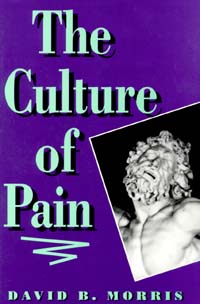 | Title: The culture of pain Author: Morris, David B Published: University of California Press, 1991 Subjects: Science | Medicine | Literature | History Similar Items |
| 15. | 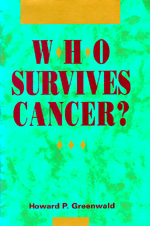 | Title: Who survives cancer? Author: Greenwald, Howard P Published: University of California Press, 1992 Subjects: Sociology | Environmental Studies | Medicine Publisher's Description: FACT OR FICTION? *A white male earning over $35,000 a year has a better chance of surviving most types of cancer than an unemployed African-American male.*Psychological factors predispose people to contracting cancer and improved emotional health promotes recovery.*Early detection is useless in curing cancer.*Experimental, not conventional, treatments offer the most benefits and longer survival rates to cancer patients.*A scientific breakthrough of practical and immediate significance in cancer treatment is imminent.*Cancer prevention is ineffective in many areas and campaigns will probably never achieve a reduction of cancer mortality approaching 50 percent.*Health Maintenance Organizations (HMOs) increase survival chances for most cancer patients.Howard Greenwald takes an incisive new look at how class, race, sex, psychological state, type of health care and available treatments affect one's chance of surviving cancer. Drawing on an original ten-year survival study of cancer patients, he synthesizes medical, epidemiological, and psychosocial research in a uniquely interdisciplinary and eye-opening approach to the question of who survives cancer and why.Scientists, health care professionals, philanthropists, government agencies, and ordinary people all agree that significant resources must be allocated to fight this dreaded disease. But what is the most effective way to do it? Greenwald argues that our priorities have been misplaced and calls for a fundamental rethinking of the way the American medical establishment deals with the disease. He asserts that the emphasis on prevention and experimental therapy has only limited value, whereas the availability of conventional medical care is very important in influencing cancer survival. Class and race become strikingly significant in predicting who has access to health care and can therefore obtain medical treatment in a timely, effective manner. Greenwald counters the popular notion that personality and psychological factors strongly affect survival, and he underscores the importance of early detection. His research shows that Health Maintenance Organizations, while sometimes prone to delays, offer low-income patients a better chance of ultimate survival. Greenwald pleads for immediate attention to the inadequacies and inequalities in our health care delivery system that deter patients from seeking regular medical care.Instead of focusing on research and the hope for a breakthrough cure, Greenwald urges renewed emphasis on ensuring available health care to all Americans. In its challenge to the thrust of much biomedical research and its critique of contemporary American health care, as well as in its fresh and often counterintuitive look at cancer survival, Who Survives Cancer? is invaluable for policymakers, health care professionals, and anyone who has survived or been touched by cancer. [brief] Similar Items |
| 16. | 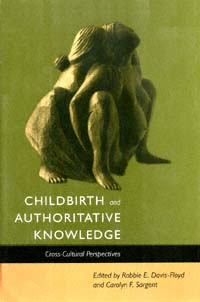 | Title: Childbirth and authoritative knowledge: cross-cultural perspectives Author: Davis-Floyd, Robbie Published: University of California Press, 1997 Subjects: Anthropology | Women's Studies | Medicine Publisher's Description: This benchmark collection of cross-cultural essays on reproduction and childbirth extends and enriches the work of Brigitte Jordan, who helped generate and define the field of the anthropology of birth. The authors' focus on authoritative knowledge - the knowledge that counts, on the basis of which decisions are made and actions taken - highlights the vast differences between birthing systems that give authority of knowing to women and their communities and those that invest it in experts and machines. Childbirth and Authoritative Knowledge offers first-hand ethnographic research conducted by anthropologists in sixteen different societies and cultures and includes the interdisciplinary perspectives of a social psychologist, a sociologist, an epidemiologist, a staff member of the World Health Organization, and a community midwife. Exciting directions for further research as well as pressing needs for policy guidance emerge from these illuminating explorations of authoritative knowledge about birth. This book is certain to follow Jordan's Birth in Four Cultures as the definitive volume in a rapidly expanding field. [brief] Similar Items |
| 17. | 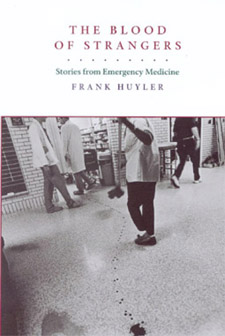 | Title: The blood of strangers: stories from emergency medicine Author: Huyler, Frank 1964- Published: University of California Press, 1999 Subjects: Medicine | American Literature | Autobiography Publisher's Description: Reminiscent of Chekhov's stories, The Blood of Strangers is a visceral portrayal of a physician's encounters with the highly charged world of an emergency room. In this collection of spare and elegant stories, Dr. Frank Huyler reveals a side of medicine where small moments - the intricacy of suturing a facial wound, the bath a patient receives from her husband and daughter - interweave with the lives and deaths of the desperately sick and injured. The author presents an array of fascinating characters, both patients and doctors - a neurosurgeon who practices witchcraft, a trauma surgeon who unexpectedly commits suicide, a wounded murderer, a man chased across the New Mexico desert by a heat-seeking missile. At times surreal, at times lyrical, at times brutal and terrifying, The Blood of Strangers is a literary work that emerges from one of the most dramatic specialties of modern medicine. This deeply affecting first book has been described by one early reader as "the best doctor collection I have seen since William Carlos Williams's The Doctor Stories ." [brief] Similar Items |
| 18. | 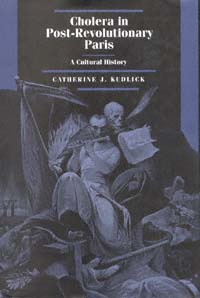 | Title: Cholera in post-revolutionary Paris: a cultural history Author: Kudlick, Catherine Jean Published: University of California Press, 1996 Subjects: History | European History | Medicine Publisher's Description: Cholera terrified and fascinated nineteenth-century Europeans more than any other modern disease. Its symptoms were gruesome, its sources were mysterious, and it tended to strike poor neighborhoods hardest. In this insightful cultural history, Catherine Kudlick explores the dynamics of class relations through an investigation of the responses to two cholera epidemics in Paris.While Paris climbed toward the height of its urban and industrial growth, two outbreaks of the disease ravaged the capital, one in 1832, the other in 1849. Despite the similarity of the epidemics, the first outbreak was met with general frenzy and far greater attention in the press, popular literature and personal accounts, while the second was greeted with relative silence. Finding no compelling evidence for improved medical knowledge, changes in the Paris environment, or desensitization of Parisians, Kudlick looks to the evolution of the French revolutionary tradition and the emergence of the Parisian bourgeoisie for answers. [brief] Similar Items |
| 19. | 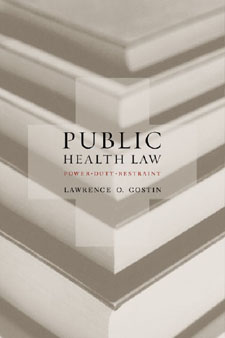 | Title: Public health law: power, duty, restraint Author: Gostin, Larry O. (Larry Ogalthorpe) Published: University of California Press, 2001 Subjects: Law | Medicine | Public Policy Publisher's Description: Gostin's timely book offers the first systematic definition and theory of public health law. Basing his definition on a broad notion of the government's inherent responsibility to advance the population's health and well-being, he develops a rich understanding of the government's fundamental powers and duties. By analyzing constitutional powers and limits, as well as statutory, administrative, and tort law, Public Health Law vividly shows how law can become a potent tool for the realization of a healthier and safer population. [brief] Similar Items |
| 20. | 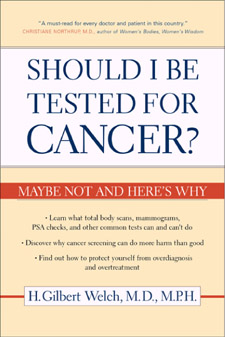 | Title: Should I be tested for cancer?: maybe not and here's why Author: Welch, H. Gilbert Published: University of California Press, 2004 Subjects: Medicine | Health Care | Disease Publisher's Description: Getting tested to detect cancer early is one of the best ways to stay healthy - or is it? In this lively, carefully researched book, a nationally recognized expert on early cancer detection challenges one of medicine's most widely accepted beliefs: that the best defense against cancer is to always try to catch it early. Read this book and you will think twice about common cancer screening tests such as total body scans, mammograms, and prostate-specific antigen (PSA) tests. Combining patient stories and solid data on common cancers, Dr. H. Gilbert Welch makes the case that testing healthy people for cancer is really a double-edged sword: while these tests may help, they often have surprisingly little effect and are sometimes even harmful. Bringing together a body of little-known medical research in an engaging and accessible style, he discusses in detail the pitfalls of screening tests, showing how they can miss some cancers, how they can lead to invasive, unnecessary treatments, and how they can distract doctors from other important issues. Welch's conclusions are powerful, counterintuitive, and disturbing: the early detection of cancer does not always save lives, it can be hard to know who really has early cancer, and there are some cancers better left undiscovered. Should I Be Tested for Cancer? is the only book to clearly and simply lay out the pros and cons of cancer testing for the general public. It is indispensable reading for the millions of Americans who repeatedly face screening tests and who want to make better-informed decisions about their own health care. [brief] Similar Items |